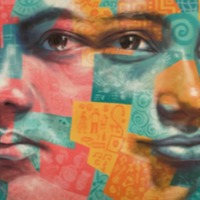
I did not have an easy upbringing. Many people travel because they see neighbours travel. A man took me to a shrine and told me to swear an oath [not to run away] and told me if I told anyone I would be cursed. When we got to Agadez, there was no food or water, many had died. The journey was very rough. People from Niger also travelled, and from Senegal and Burkina Faso, but lots of them died in the desert. We continued the journey til we got to Libya. When the person took my money, he told me I would be selling clothes to white people in a boutique. The guy that transported us did not pay our money for the sea crossing, so I was forced to do prostitution. I was told if I didn’t do the prostitution, I would be killed. I was bought for 2,000 dinars [around £1,100], which I was supposed to repay. After I had paid double that, I was sold again. I was helpless and had to do what they said. They don’t use protection, no condoms. Since I came back from Libya, I was struggling a lot. I then got involved with [NGO Y]. They asked what was I interested in and I said fashion. They put me into a fashion course. I started in May and graduated in December. By the grace of God, I am now a fashion designer.
Narrative provided by ICAI









